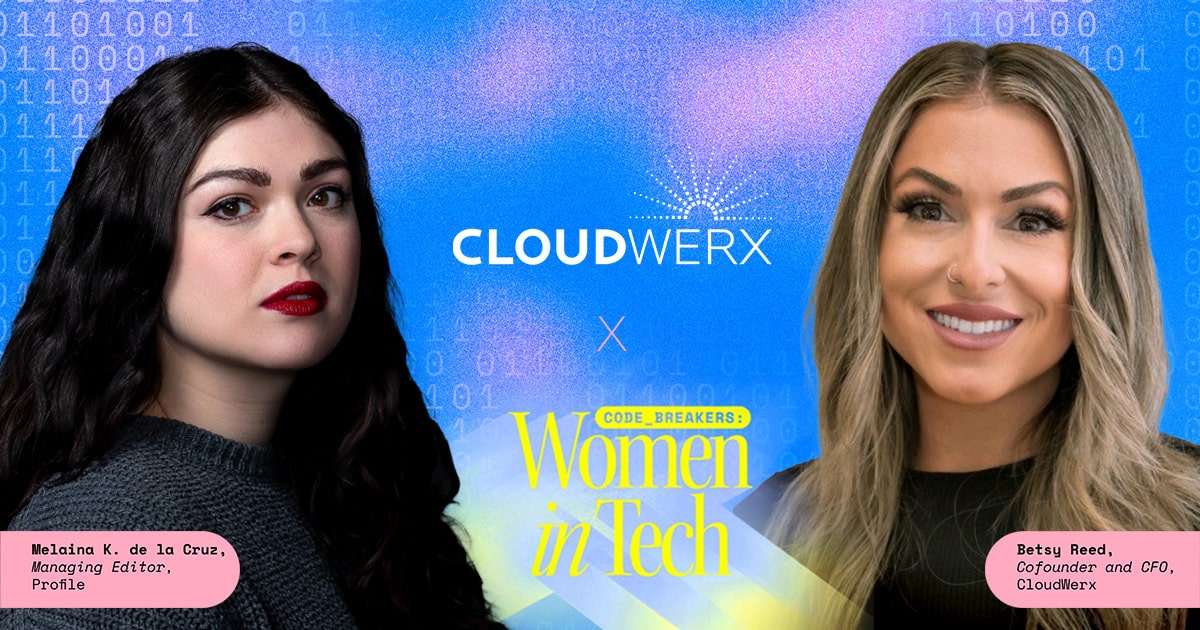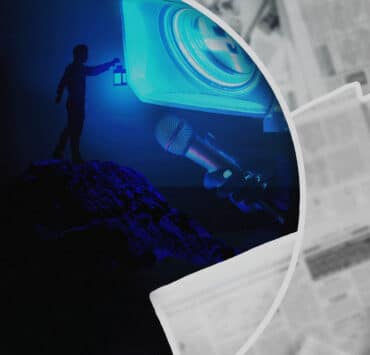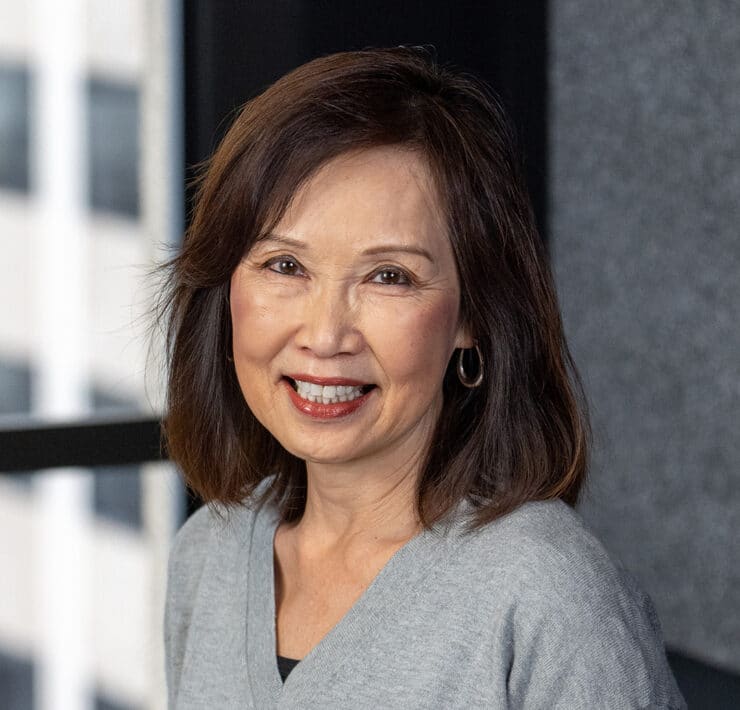
|
Getting your Trinity Audio player ready... |
As the world of tech evolves and continues to shape our world, Betsy Reed is looking up—to the cloud, that is. In 2020, Reed united her marketing and team-scaling skills with sales pro Jason Geis’s entrepreneurial aptitude and strong network to cofound CloudWerx, a full-service enterprise cloud consulting firm.
Only two years later, CloudWerx reached premier status in the Google Cloud Partner Program, setting a record for how quickly it was able to do so. So how did the company’s cofounder and chief revenue officer (CRO) make such a name for herself in the world of tech? Reed joined Profile’s managing editor, Melaina K. de la Cruz, for an exclusive interview to talk synergy, imposter syndrome, and a commitment to delivering an “11/10 experience” to her customers.
De la Cruz: I’m Melaina de la Cruz. I’m the managing editor of Profile, and I’m thrilled to be here today with Betsy Reed, the cofounder and CRO of CloudWerx, a lead cloud consulting company and Google Cloud premier partner. So, thank you so much, Betsy, for joining me.
Reed: Thank you, Melaina. Nice to meet you on Zoom and excited for our conversation today.
Definitely. So, let’s kick things off: I wanted to know, first, did you always know that you wanted to be in the tech field?
That’s a great question. I definitely knew that I wanted to be in a fast-paced type of industry relative to my career. I was in advertising and journalism out of school and got my start at a tech start-up in Portland [Oregon] right out of college. And I loved the fact that there was a measurable and quantifiable way to deliver success and value to customers.
And I think whether that’s tech or whatever definition we want to put around it, that’s what I got really excited about. So, I loved learning about technology and how you can really leverage the power of it to not only drive results but then deliver them and then actually showcase to a customer what those measurable results are, and that kind of dictated my love and passion and career in tech.
Absolutely. So, I would assume that that is also what led you to found CloudWerx.
Yeah, definitely. After many years in sales and sales leadership running organizations all the way from the client services aspect, the SDR [sales development representative] and AE [account executive] aspect, and working in a number of different capacities relative to tech sales and B2B sales, it became apparent that I was somebody that was interested in having my own company.
I wanted to create a business that wasn’t based only on the right time in the market. So, cloud is definitely one of the most important technologies that’s developing in the space, but also understanding where that opportunity is to bring a huge amount of value-add into a specific ecosystem, which is the public cloud ecosystem.
This is why we chose to partner with Google Cloud as well. So those factors being at play and many years of kind of thinking, “Hey, if I were to do this myself, these are the ways that I would do things differently, or these are the things I’ve learned along the way, or this is the kind of team I would want to build.”
All of those elements created kind of the perfect environment and drive to say it’s time to create a company. And that company was called CloudWerx.
That’s awesome. That’s really great that you’re able to tap into your intuition with that and combine that with the business skills. So, an impressive thing: you cofounded CloudWerx without any outside funding. In an industry that’s always evolving and demanding you to prove what you can do differently than other companies—not to mention it being a very male-dominated space—I’m wondering how you were able to execute all of that.
You mean executing on the business plan and just kind of where we’re at today based on where we began? We had the fortune of not having to take any outside investment in order to form the company based on Jason Geis, our CEO and cofounder, being our seed investor. Prior to cofounding CloudWerx, he owned and ran a successful business which allowed him to fund our beginning.
It allowed us to have the chance to say, “We want to build this company; we’re going to build it from the ground up.” We’ve been really discerning about the expenses and expense management, really building it brick by brick without overextending ourselves.
But having to have that delicate balance between growth and stability—that’s something that’s really challenging for any business owner, especially when you’re starting to understand where you’re really able to put the foot on the gas pedal to accelerate your growth and scale. And you really need to make sure that you’re managing to the business to know day in and day out that you can deliver to your customers, that you can control your expenses, and that you can continue to really be deliberate about your profitability to function.
“I think about [synergy] as an orchestra. One [team] can’t go without the other. . . . Whether it’s sales or your service staff or your 24/7 folks, the engineers—everybody has an important seat at the table, and understanding each individual’s role or each department’s role is critical.”
Betsy Reed
And so that’s a testament to Jason’s prior successes and the ability that we had to form this business and really grow it in a scalable way.
I would say I’m a people person, right? And so I never have really thought about myself being in a male-dominated industry. I just do what I love, and I do it with passion and gusto. But it doesn’t mean that looking back, it’s not super gratifying to say, “Yeah, I suppose this is something that’s quite different.” And I just think about it as what’s the next logical step in order to achieve success, to support our team and our employees and the people that we made commitments to in that regard, and then also our customers.
So that’s how we were able to kind of get our start. And in the grand scheme of things, partnering with Google Cloud specifically, we’re able to represent the best product on the market (from our humble perspective) for the customers where it makes the best fit, selling Google Cloud and then servicing those customers using their public cloud offering.
We just believe it. It gives us that capability. We get to basically rep and service the best brand in the world. And that makes it . . . I don’t want to say “easy,” because there’s a lot of work that goes into it. But from a building a company perspective, we get to leverage all the time and talent and resources and expertise that Google [Cloud] has amassed over the last twenty years, building this incredible infrastructure.
And we get to just make sure that it’s scaled, secure, and able to really provide its customers with what they need.
Absolutely. And so that kind of feeds into my next question, that when people think about tech, they tend to think about the coders and the engineers. So can you talk to me a bit about the synergistic role that the salespeople play to connect these innovative products with growing companies and their customers?
Absolutely. One of my favorite [things] really, I would say [is] the dance. Or, I think about it as an orchestra. One [team] can’t go without the other. And you need—whether it’s sales or your service staff or your 24/7 folks, the engineers—everybody has an important seat at the table and understanding each individual’s role or each department’s role is critical.
The interplay of sales and engineering is one of my most favorite areas because I’ve always been in sales, leadership, and revenue leadership. But being in sales, you have the front line—you know, voice of the customer, the needs of the market—and I’ve seen a lot of technology companies that lead only with engineering. So it’s like, man, this is a cool idea for a product or service, but it’s not founded in the utility from the customer’s point of view and then vice versa.
I’ve been in organizations where it’s entirely driven by sales and sales only, and so it’s kind of like there may be some utility, but there’s some value that may be missed for the full-value picture. And so when I try to think about within CloudWerx, what we bring to the table is our sales team, and really they end up managing the client relationship as well.
They’re kind of a full-suite or full, I would say, customer experience management. They work hand in hand with our technical sales engineers as well, who are targeted at doing strategic discovery to drive the business outcomes that we know we need to drive for our customers. So I say, “Garbage in, garbage out. Gold in, gold out.”
“With every right move you make, there’s going to be maybe an outcome you didn’t anticipate. That in and of itself is a learning opportunity, right? So we’re never done, and you can’t get it wrong.”
Betsy Reed
The way you set up these engagements from the jump—in terms of properly scoping out the needs of the business, the business strategy, their product road map—when we’re working with digital native hyperscale companies, we have to understand what their entire product road map and business road map is.
The sales team and our client facing firm the beginning, they need to make sure that they’re, number one, identifying the proper ways to do discovery. Number two, engendering the trust from that customer that we’re not just being brought in to spin up a cloud environment for them. We’re really their success partner. For example, we have work with a lot of tech and SaaS companies. When they’re successful with their first maybe they’re pre-customer, right? They get that first, second, third, fourth customer.
We win when that happens. Google [Cloud] wins when that happens. The customer wins when that happens. So [it’s about] the delicate balance between proper scoping, proper discovery, and the entire client experience and then making sure that gets fed back to the customer engineers on the Google Cloud side, our technical team.
So they’re deploying resources properly and we’re delivering on what we said. It all goes back to what I think I may not have mentioned on this call yet, but the CloudWerx commitment to 11/10, and that 11/10 truly just means that in any experience or engagement that we have—whether it’s with a Google [Cloud] person, one of our customers, between each other, or other partners—that somebody is leaving that experience . . . even you, even this interview, Melaina. I hope you’re leaving, going, “You know what? They overdelivered.”
That’s what 11/10 means. So it takes it takes all of that, all of the team members and all of the different departments to do that. It takes them [all]. I love the term you used, working “synergistically” together. One of my favorite things to say [is]—we don’t typically have any discord in those teams, but I say we’re all on the same side of the table. We really are. This is an entirely team-motivated endeavor when we’re talking about cloud transformation or the storage strategies for our customers.
Absolutely. Yeah. Because you want to love the products. You want to be able to talk about the product. And of course, you want people to understand the products. There’s so much cool tech out there, but it can’t go as far as it needs to if people don’t get it, right?
Exactly. Exactly. Yes.
I know that one of your big mottos is “You can’t get it wrong, and you never get it done.” So how do you apply that to your sales career journey and your tech journey?
Oh, I love that quote for so many reasons because I think in young career people or even just in the journey of taking on risk and understanding that life is not a linear path, you take all these twists and turns. And the point is, there’s the “You can’t get it wrong” and “You never get it done.”
It’s also like there’s nowhere to get to. And I definitely started out my career with, like, there’s somewhere to get to! No, there’s nowhere to get to. The thing in life and in career, if you think about [how] there’s all these risks or you’re always mitigating because you want to get it right, you’re going to miss opportunities because there’s no such thing.
And with every right move you make, there’s going to be maybe an outcome you didn’t anticipate. That in and of itself is a learning opportunity, right? So we’re never done, and you can’t get it wrong. And as long as you’re learning and evolving, there’s this constant ability to continue to grow and evolve that, you know, my gosh. I’ve learned—it’s so corny—but I’ve learned so much more from things that I screwed up than anything, right?
Yeah. I totally get that.
And so calculated risks are important. I always say, “Fail fast, fail hard, move on, dust yourself off.” You know, get knocked down seven times, get up eight. And in in my career specifically, I would have stayed small and I would have stayed predictable if I had let myself be dictated by a path of life that was dedicated to always being right and think[ing] that there was some outcome or place to get to.
And now I’m just like, I’m just getting started, right? It just feels like there’s all the potential in the world. And so I encourage my team as well [to] hold yourself accountable to very high standards of accountability. But that doesn’t mean we’re going to be right all the time, and it doesn’t mean that we’re not going to make mistakes.
But just try not to make the exact same one two times, right?
Yes.
And own it. And if you mess up, just own it.
Yeah, I love that. Reframing a challenge or a failure as an opportunity. And so, what other sorts of opportunities do you want to see out there for women who are still early in their careers and have so much more of? Because it’s not about the destination, it’s about the journey—and that’s kind of cliché—but for women that still have so much journey left, what sorts of opportunities do you want to see for them?
I think one of the things that has helped me along the way is providing women with the confidence and bravado to take risks and take chances. And you can’t necessarily create a mentorship program about that. You can’t necessarily create a framework or a training protocol about that. But I do think it’s a mindset, and I know that for me in my career, I’ve been blessed with the opportunity to work with different career coaches, leadership coaches, executive coaches that helped to really support that in me and the mindset shift.
And so more than even tactical or technical training, or even help with your résumé or whatever, it starts with the mindset. Because if you don’t have that concept, that “I can be and do and have anything, and in that, I’m going to have to maybe go out over my skis a little bit and I’m going to feel really uncomfortable at different points.”
If you don’t have that as your foundation, then it doesn’t matter what your résumé says, because you’re probably right! You’re keeping things small on there. You’re not even opening yourself up to the opportunities that are, you know, greenfield for you and your concept.
So I really want to see more opportunities for women to have access to mindset and coaching that lays the proper foundation to launch them into their absolute, most grand potential.
I think one of my biggest things that I tried to remind myself of is, “Am I awake to my fullest potential?” I can tell you at different points in my career, the answer was no. The answer was no, I was not. I was playing it small; I was playing it safe. And sometimes at different points in your life, that is what you can do, given the resources and what else you have on your plate.
But if you want to be great and you really want to, you know, go for any dream you have, then you do need to start with that mentality of like, “I’m going to challenge myself, and I’m going to trust that I can move forward even in the spaces where I’m really uncomfortable or that I have never gone before.”
“Don’t take yourself too seriously. Especially as a woman, especially in tech, especially in sales, especially in roles that are not typical for women in a male-dominated industry.”
Betsy Reed
Absolutely. Yeah, and I really like that there’s more of a focus these days on not just technical skills, but, like, having a high EQ and just learning a lot more about confidence and getting over imposter syndrome and leading with empathy and all those things. I think it’s great. I’m glad those are all having moments.
Yes! And the imposter syndrome is real. And by the way, we should always be feeling a little bit like an imposter all the time, because if we’re not then it means that we’re never trying out something new, or we’re never putting those shoes on that, like, “Oh, I haven’t done this before.” So I think also it’s a fallacy to think that we all don’t feel that way.
And then if you don’t share with each other, you’re like, “Well, you know, Melaina is this highfalutin editor, and she has it all figured out and she never—no. But you being like, “You know, sometimes I feel like an imposter.” I’m like, “Sometimes I feel like an imposter.” I’ve never had a company before this, but you know what? I’m doing it and we’re figuring it out and it’s going really well.
And there’s still things every day that I’m learning for the first time, and how cool is that? But normalizing that as opposed to saying, “Here are all my credentials, which make me fit for the job,” it’s almost like, “Here’s my potential. Here are my skills and abilities. Here are goals for the next five to ten years. And this is why I deserve to have a seat at the table.” That’s where I would like to see us get to a little better. And I would like more programs or opportunities for women to have access to that kind of mentorship structure.
And so for my last question here, I feel like this entire talk has been just filled with great gems of inspiration. But is there a single piece of advice beyond all of this that you wish you were given in the beginning of your career that you would like to offer up now for future founders?
It’s not even for future founders, but something that I wish I had embodied more. And I just actually had an amazing experience with the woman who is new in sales. And she was actually selling to me last week because we’re looking to get some new marketing partnerships.
So, she’s selling to me. It was not a very good experience, candidly, on my end. And I took the opportunity to say, “You know, you didn’t ask, but permission to coach.” That’s what one of my sales coworkers used to say, she’d say, “Permission to coach.” And I’m like, “I don’t think I have a choice, but sure.” [Laughs] And so I asked her if we could set up some time, and [said] I would be giving her some feedback with the goal for it being a contribution to her as a salesperson.
She could tell me to go kick rocks. That’s fine, too. If she wanted to set up some time [so I could say] “No, I’m not going to buy from you, but I am happy to sit down and talk with you about where I see some opportunities for improvement.” So I did that, and there were some very specific pieces of feedback, right?
It’s like, know your audience more. Weave in the discovery call that we had earlier, make sure that you are emphasizing that you heard what I said. But really at the at the end of the day, the biggest thing that I told her, which is something I wish I would have known right when I came out of the gate, is don’t take yourself too seriously. Especially as a woman, especially in tech, especially in sales, especially in roles that are not typical for women in a male-dominated industry.
There is this—maybe it’s just me, but I feel like I’m not the only one—there is a pressure to be so professional, so overly professional, so you’re taken seriously. But really, it’s so you’re not not taken seriously.
Right? Because you’re a woman or maybe you’re younger or whatever it is that we overcompensate by being really professional and really dry and really robotic. And it doesn’t mean we’re not professional in the sense that we [don’t] have decorum and we’re [not] doing the proper things for them. But I mean, we have personalities and it’s OK to have a personality, and it’s OK to have that—with reason—come through in the work you do all the time.
You don’t have to cover that up. And I was like, my one thing that I said, “If you take nothing away from this conversation, that is what I would say: I’m sure you have a personality in there and by the way, I wish I would have known that.” And she was like, “You know, I really have been struggling with that.”
And I said, “Listen, I’ve been on so many sales calls—and this is not judgmental of men at all. I love all the gentlemen that I’ve had the pleasure working with—but they jump on the call, they don’t think twice about asking about the ball game, the sports thing, the small talk. They don’t think twice. They dive right into it.”
Well, she was like, “I actually—when we started on the Zoom call, I wanted to ask you where you got your glasses and frames. But I thought, no, I don’t want to do that because I don’t want her thinking I’m brownnosing or, you know, it’s inappropriate.”
But do you see what I’m saying? These are some things that are so deeply conditioned in our minds. We don’t even think about it. And I’m like, “By the way, they’re Tom Ford. I got them from smart glasses dot com or whatever.” And I’m like, “Check it out!” And so that’s something I wish I would have known and it’s something that I wish more people would [know], more women [or] whoever it is that’s having a challenge with that. It’s OK to have a personality, and don’t take yourself too seriously.
Oh yeah, I love that. I think that’s one of those skills that we don’t think about, like when we’re putting together a résumé—and not that this needs to go on the résumé—but to just see your personality as a skill that you have.
Yeah, have that confidence! You don’t have to be a robot. And if those are the only circumstances under which you are going to be respected and taken seriously, then I suggest you reevaluate whoever you’re interacting with on the other side.
Definitely.
And really owning that and stepping into that power and understanding that you can be yourself. And by the way, that’s fabulous. And by the way, you’re going to actually, probably, get better outcomes that way too.
Yeah, definitely. Well, awesome. Thank you so much for all of this. It’s been so great to talk to you and to hear from you about all of these things and like you said, I am walking away from this now, taking in so much new information about just being confident, founding a business, understanding the tech world. So thank you for that.
You’re welcome. And it’s just like, don’t wait. Don’t wait. Whatever you’re thinking about, don’t wait to do it. Take a calculated risk, make a plan, reach out to your resources. But don’t wait. We only have one chance. In this environment, go for it.
Watch the full interview
This interview was edited for length and clarity.
Photos: Sheila Barabad Sarmiento (de la Cruz) and Phong Tran (Reed)
Video: Cass Davis
Header Graphic: Anastasia Andronachi







